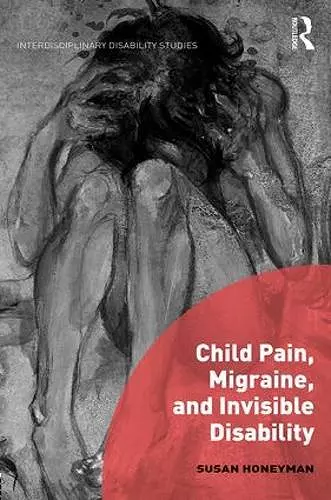Child Pain, Migraine, and Invisible Disability
Understanding the Intersection of Pain, Childhood, and Disability
Format:Hardback
Publisher:Taylor & Francis Ltd
Published:10th Nov '16
Currently unavailable, and unfortunately no date known when it will be back
This hardback is available in another edition too:
- Paperback£41.99(9780367208196)

This insightful exploration addresses the often-overlooked needs of children suffering from migraines, as discussed in Child Pain, Migraine, and Invisible Disability.
In the twenty-first century, there is a growing global acknowledgment that pain relief is a fundamental human right. However, in Child Pain, Migraine, and Invisible Disability, Susan Honeyman highlights how this recognition has often been shaped by adult ideological needs, leaving the specific requirements of children in pain marginalized or ignored. This book provides a critical perspective on how societal views have historically sidelined the voices of young patients, emphasizing the need for a more child-centered approach to pain management.
The book delves into the experiences of children suffering from migraines, exploring the profound social and disabling impacts of chronic pain. By utilizing a blend of medical, political, and cultural discourse, Child Pain, Migraine, and Invisible Disability sheds light on the concept of invisible disabilities among children with migraines. Honeyman supports her arguments with authentic accounts from migraine sufferers and first-hand interviews, alongside a rich array of historical, literary, and medical references that have never before been compiled in a child-focused context.
Moreover, the book examines representations of child pain and migraines across literature, art, and popular culture, offering an interdisciplinary framework for understanding these issues. It will resonate with scholars in fields such as childhood studies, disability studies, and medical humanities, as well as anyone who has experienced migraines or cared for children dealing with chronic pain.
'The Western contemporary ethos confers innocence and nostalgia on childhood, a tendency that too often belittles, denies or oversimplifies the suffering that real children experience. Young sufferers from migraine are consummate examples of this dilemma, as Susan Honeyman documents well in Child Pain, Migraine and Invisible Disability. Health care providers, who generally ask children to report pain using a reductionist single answer on a pain scale, would do well to consider Honeyman’s complex, humane account (including first-person narratives).'—Cindy Dell Clark, Rutgers University, U.S.A
'The Western contemporary ethos confers innocence and nostalgia on childhood, a tendency that too often belittles, denies or oversimplifies the suffering that real children experience. Young sufferers from migraine are consummate examples of this dilemma, as Susan Honeyman documents well in Child Pain, Migraine and Invisible Disability. Health care providers, who generally ask children to report pain using a reductionist single answer on a pain scale, would do well to consider Honeyman’s complex, humane account (including first-person narratives).'—Cindy Dell Clark, Rutgers University, U.S.A
"I cannot write a dispassionate review of this book. I read sections of this book aloud to my partner, who was my companion through twelve years of migraine. I wept in recognition and fulminated on behalf of my fellow migraineurs. I became intensely angry on behalf of today’s child migraineurs for whom not only many things not have become better, but for whom modern ideologies of education have created an increasingly hostile environment. This book needs to be in paperback and Kindle, and a copy needs to be handed to every medical student and teacher." --Farah Mendlesohn, The Lion and the Unicorn
ISBN: 9781138207868
Dimensions: unknown
Weight: 430g
220 pages